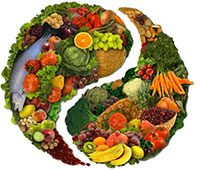Food Quality
The human body is an organic machine that requires food and water to perform its many functions. Like any machine, the quality of the resources provided affects the efficacy of the machine’s performance. One facet of performance is using a resource that is the machine was designed to use. For humans, that resource is whole food and pure water from the Earth.
Unfortunately, these resources are less nutrient-dense from agricultural short-cuts and poor soil quality, and often contain contaminants. We also have access to any type of food from any part of the planet, modifying our habits of eating what is available locally, based on the season. This has decreased the diversity of fruits and vegetables that we eat, decreasing a valuable resource, soluble fiber.
The human body has evolved to utilize soluble fiber as a resource to feed our digestive ecosystem, and complete repair work to the digestive tract. Our ancestors ate an array of fruits and vegetables, where the average person today does not meet their daily recommended intake of soluble fiber, impairing digestive health.
We’ve also changed our motivation for eating. Our ancestors either ate to survive, or ate to maintain their health. Today, the average person eats for pleasure and convenience. Our grandparents regularly ate organ meats such as liver. People then appreciated the fact that food was medicine, and eating liver was one of the best ways to avoid illness. Then penicillin came along and our parents turned their noses up to liver. “Why eat liver when I can take an antibiotic?” Luckily the baby boomers maintained one good food habit, eating a balanced family dinner consisting of a protein, starch, and a vegetable. But this is even disappearing. Generation X is the processed food generation. Refined foods with lots of preservatives that have been modified to increase desire. These foods have caused a further digression in our digestive health, distracting us from real, whole foods, taxing our energy systems for little nutritive gain, and lots of toxicity.
Luckily people have woken up to this fact and are moving toward eating organic, pasture-raised, and local. CSAs are now easily accessible, and mindful companies like Thrive Market now exist.
How do you begin to reverse this damage?
Avoid processed, refined, genetically modified (GM) foods. Eat real, whole food. Here are key words to look for when shopping:
Resources
Thrive Market is a membership community that uses the power of direct buying to deliver the world’s best healthy food and natural products to their members at wholesale prices, and to sponsor free memberships for low-income American families. YOU SAVE. EVERYONE THRIVES.
The Environmental Working Group (EWG) is a non-profit, non-partisan organization dedicated to protecting human health and the environment. Their website is a great resource for assessing the quality of a product you are considering buying, or looking for a clean recommendations.
EWG Consumer Guide Scorecards:
WATER
5 Reasons to Skip Bottled Water
National Tap Water Database
Water Filter Buying Guide
FOOD
Food Scores
Guide to Avoid GMO Food
Guide to Seafood
Shopper’s Guide to Pesticides in Produce
Guide to Good Food on a Tight Budget
Children’s Cereal
Dirty Dozen Endocrine Disruptors
SKIN
Personal Care Products
Skin Deep Guide to Cosmetics
Guide to Bug Repellants
Guide to Sunscreens
HOME CARE
Healthy Home Tips
Guide to Healthy Cleaning
ENVIRONMENTAL
Guide to Safer Cell Phone Use

The Cornucopia Institute engages in educational activities supporting the ecological principles and economic wisdom underlying sustainable and organic agriculture. Through research and investigations on agricultural issues, The Cornucopia Institute provides needed information to consumers, family farmers, and the media. It is recognized by the IRS as a tax-exempt 501(c)(3) public interest group.
The Cornucopia Institute is a great resource to see how your organic product scores within its category, or to determine which product is best.



